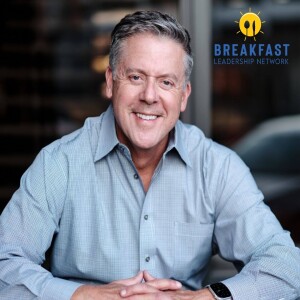Tuesday Aug 13, 2024
Future of Work Expert Steve Cadigan on Leadership, Talent Strategies & Burnout Solutions | Ex-LinkedIn CHRO

Steve is a top talent strategist and leadership expert with 30+ years of experience. He famously led LinkedIn’s early hyper-growth phase as its first CHRO, building its world-class company culture from scratch and scaling the organization from 400 to 4,000 employees.
As one of the most provocative global thought leaders on the future of work, Steve is hired by top companies and entire countries to help them navigate the talent landscape. His clientele spans from Google, X, Slack, BBC, and Intel to the City of Lisbon, which hired him to develop the startup incubator Unicorn Factory.
His award-winning book Workquake is considered a game changer for leaders and organizations on the future of work in a post-COVID world. He has also written for Forbes and Inc. and will soon write for Business Insider. He frequently appears on Bloomberg and CNBC to discuss the evolving nature of work, talent management, the Big Resignation, and successful leadership.
Steve is a sought-after keynote speaker who has delivered commencement addresses at Stanford and the University of San Francisco. Legacy institutions like Harvard and top VCs and management firms, including Accenture, Deloitte, and McKinsey, regularly ask him for advice.
| Quick recap | |
| Summary | |
| Future of Work and Talent Challenges | |
| Michael and Steve discussed the future of work and the challenges leaders face in managing talent. Steve, with over 40 years of experience in human resources, shared his insights on how the work landscape has changed, particularly in the wake of the Covid-19 pandemic. They both agreed on the importance of their conversation and discussed the challenges organizations are facing in talent acquisition and retention. Steve emphasized that leaders need to understand and adapt to these changes to effectively motivate and retain their employees. | |
| Burnout, Healthcare Challenges, and Enrollment Trends | |
| Michael and Steve discussed the challenges and burnout issues faced by healthcare professionals, particularly during the pandemic. They highlighted the decreasing number of people working in the healthcare field and the unprecedented challenges faced by healthcare systems. Steve noted the significant number of people leaving the education field, indicating a broader failure in these essential professions. They also discussed the challenges faced by the nursing profession, particularly the diminishing influx of talent and the increasing questioning of its brand. Michael agreed, noting similar issues in other industries, such as wastewater and grain elevators, where the younger generation is less interested in pursuing traditional family occupations. They also discussed the impact of decreasing enrollments in nursing schools on the education side, leading to increased costs due to reduced supply. | |
| Addressing Job Market Challenges and Solutions | |
| Michael and Steve discussed the challenges and potential solutions in the current job market. They highlighted the frustration felt by leaders and employees, and the difficulties in retaining talent, especially among younger workers. Steve shared his insights from post-pandemic conversations with leaders, noting that many were surprised by the positive business results despite high turnover rates. They both agreed that the traditional model of long-term employment may no longer be realistic or desirable, and that organizations need to adapt their strategies to attract and retain new talent. They also noted that successful companies like Microsoft and Tesla have managed to thrive with high turnover rates by having effective systems in place. | |
| College Football Coaches' Challenges and Solutions | |
| Steve and Michael discussed the challenges faced by college football coaches, particularly in the current transfer portal environment. Steve used the example of Nick Saban to illustrate the difficulties of recruiting and retaining top talent. Michael emphasized the importance of focusing on what is working and being creative in addressing issues. Both agreed on the need for business leaders to adapt to changing circumstances and to leverage their experience to find solutions. | |
| Perspective, Teamwork, and Conflicting Goals | |
| Michael shared a leadership anecdote about Roger Nirenberg, who uses music to illustrate the importance of perspective and teamwork in organizations. He emphasized the need to understand and appreciate different viewpoints within a team. Steve then discussed the concept of conflicting goals within organizations, using a soccer metaphor to explain that not everyone's objectives align, and this can lead to frustration. Both agreed on the importance of flexibility, agility, and openness to new ideas and perspectives. | |
| Employee Engagement, Communication, and Empathy in the Workplace | |
| Steve and Michael emphasized the importance of robust communication and a human-centric approach in the workplace. They discussed the need for regular performance appraisals and creating an organizational structure that promotes open communication and employee autonomy. They also highlighted the significance of maintaining a positive work environment that fosters employee engagement, creativity, and job satisfaction. Lastly, they underscored the unique value of human empathy and connection in the face of increasing automation and AI in the workplace. | |
| LinkedIn Strategies and Connector Role | |
| Steve and Michael discussed their strategies for using LinkedIn effectively. They stressed the importance of building genuine connections and providing value to others on the platform. Michael clarified his role as a connector, aiming to help individuals meet their obligations and goals. |
No comments yet. Be the first to say something!